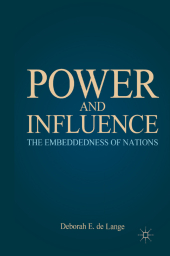 Neuerscheinungen 2011Stand: 2020-01-07 |
Schnellsuche
ISBN/Stichwort/Autor
|
Herderstraße 10
10625 Berlin
Tel.: 030 315 714 16
Fax 030 315 714 14
info@buchspektrum.de |

Deborah E. de Lange
Power and Influence
The Embeddedness of Nations
1st ed. 2010. 2011. xxii, 268 S. 3 SW-Abb. 229 mm
Verlag/Jahr: SPRINGER PALGRAVE MACMILLAN; PALGRAVE MACMILLAN US 2011
ISBN: 1-349-28965-5 (1349289655)
Neue ISBN: 978-1-349-28965-3 (9781349289653)
Preis und Lieferzeit: Bitte klicken
This book investigates whether and why social structure influences cooperative organizational strategic decision making in an international relations context. It looks in particular at the United Nations General Assembly (UNGA).
List of Figures List of Tables Foreward Preface Acknowledgements Introduction PART I: UNDERSTANDING EMBEDDEDNESS The Embeddedness View and Network Analysis International Trade Networks Military Alliance Networks Diplomatic Networks International Governmental Organizations (IGOS) PART II: DYNAMICS OF INTERNATIONAL COOPERATIVE DECISION MAKING Previous Research in International Relations Examples of Diplomatic Behavior: Backroom Bargaining and Negotiations PART III: THE UNITED NATIONS CONTEXT The United Nations and its General Assembly (UNGA) History of Decision Making in the UNGA PART IV: THE RESEARCH STUDY Research Hypotheses Data and Methods Results Economic Embeddedness Institutional Embeddedness Discussion of Results PART V: IMPLICATIONS Contributions to Political Science and International Relations For Political Scientists and Policy Makers Contributions to Strategic Management and Organizational Theory For Strategic Management Scholars and Managers Appendix A: Additional Analyses Bibliography Index
"De Lange builds on and contributes to the growing body of literature conceptualizing the international state system as a network of embedded actors. Her analysis of United Nations voting patterns demonstrates the potential of moving beyond dyadic similarity to a more comprehensive view of the state system in which each state is connected to its peers through multiple overlapping economic, political and social connections. In recent years, we have finally gone from knowing this is true to having the tools to analyze the state system accordingly. De Lange s analysis offers an important and early reference point in this progression." - Witold Henisz, Associate Professor of Management, The Wharton School of the University of Pennsylvania
DEBORAH E. DE LANGE Assistant Professor of Strategy and Business, Sawyer Business School, Suffolk University, UK.


